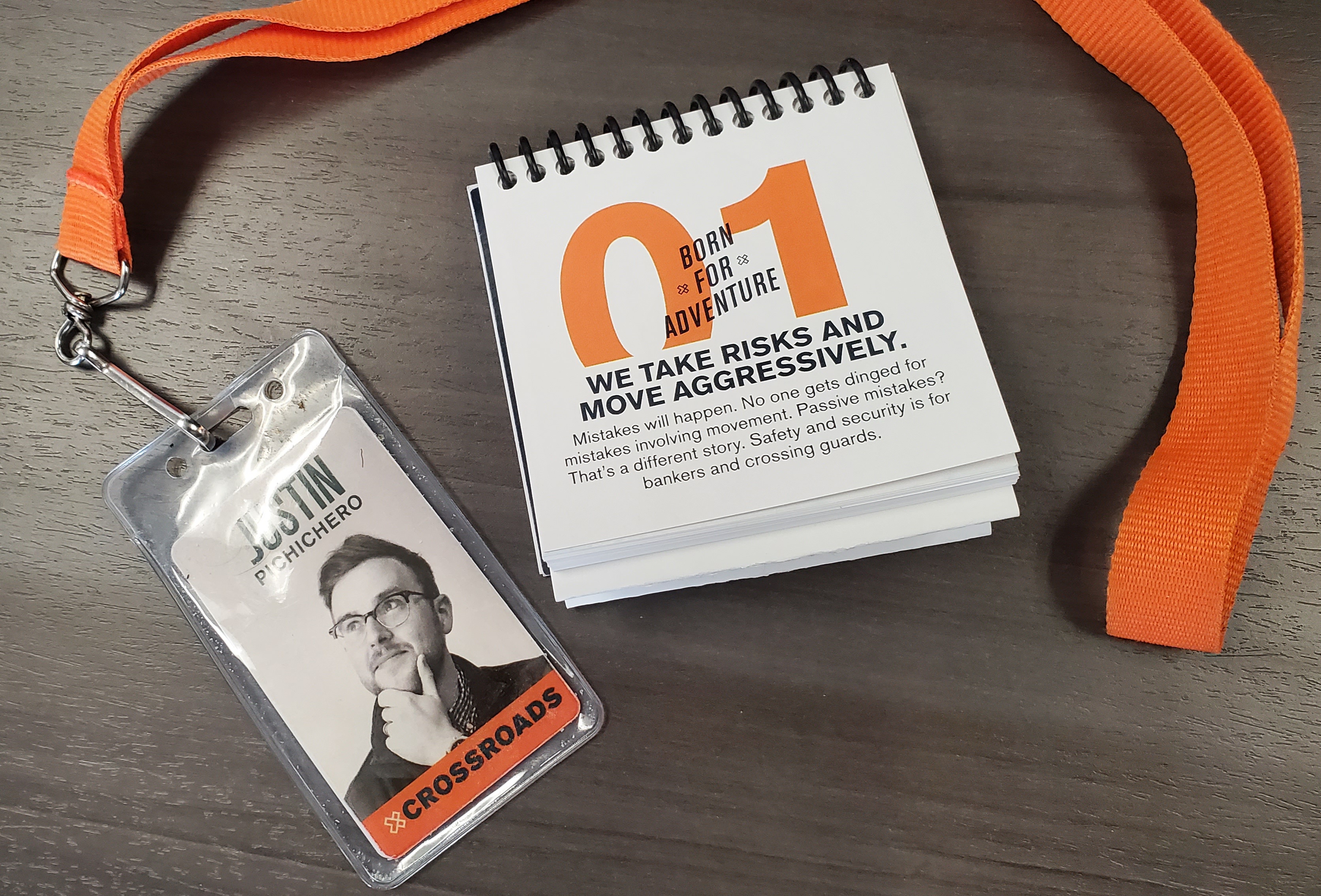❯ Leaving Staff: A (Love) Letter to Ministry
Category: Career
Series: Leadership Principles
Today is my final day getting paid to do ministry.
Today, I'm leaving Staff at Crossroads Church. Most folks writing about leaving ministry have done it from a place of hurt. Wounds of the soul come out as words on paper (or Instagram stories, I suppose) because Staff can be a tough place to be. Mission, sacrifice, career, and self become intertwined. It's a galvanizing force with a razor-thin line, hurtling towards brilliance or towards anguish. Frustration is usually the winner in the end.
Yet, there's another perspective—this essay is about that perspective.
Scandals get air time. What is discussed less is where the (small c) church excels. As I'm headed back into a world focused first on dollars and profits, I hope to take the best parts of the church with me; the bits that make myself, the people around me, and the organization I'm joining better than before.

PEOPLE-BASED STRATEGY
Years ago, Ribbonfarm wrote about two schools of strategy: Positioning (driven by numbers and models) or People (driven by organizational theory). Consulting companies poured dollars into the faux-confidence and repeatability of Positioning and it remains the dominant, first-pass approach to strategy.
On the other hand, the church has a relentless belief in People. It tilts the strategy equation away from Positioning and towards People. Perhaps because the goal is soul-driven instead of profit-driven, leadership looked at the people on hand first and then the 2x2s came later.
What this translates into is a default towards exploration and placing implicit trust in the people running the ship. It's empowering. Some roles and opportunities were created solely because of the talent available. When those folks left, they weren't backfilled because they couldn't be. It meant the church could respond to what was available and what the community needed, instead of letting organizational process and inertia rule.
APPRECIATION FOR THE ANECDOTE
I entered the job market when Big Data was the priority du jour. 84.51° was my first job. Volume, velocity, and veracity were selling points and PySpark plus Hadoop meant you had a real data shop on your hands. It set the foundation for how I operated: Data First, Decisions Second™. It served me well. What I've come to appreciate is what analytics can't tell you: where the puck is headed.
You see this reflected in Roger Martin's writing and Thick Data joining the data-centric lexicon. The data that sticks at Crossroads isn't the bar chart, but the open-ends. It's the anecdotes from Sunday morning attendees, Kids' Club volunteers, and anonymous surveys that move the church forward. It's why the "how-could-even-consider-that" experiences happen, like putting a horse on stage, and leads to baptizing 2,000 people over twelve months (the equivalent of a megachurch).
You won't find the idea of adding equine to your strategy in a data set.
UNREASONABLE HOSPITALITY
Stealing the title of a (fantastic) book about food and leadership is apt here. One key premise of Unreasonable Hospitality is to set the table for customers in a way that blows the diners away (and reinforces that you ate at Eleven Madison Park). A simple story from Will Guidara goes that staff kept an eye on the customers' parking meters and added time before they received a ticket (without charging their bill). These moments that set the experience apart? They are intentional, chosen by design to share the values of the staff.
The same idea is infused at Crossroads. From operational rhythms like Staff Training and Staff Camp to idioms like "Every Number Has a Name", it is rare to see teams and organizations so packed to the brim with culture. It clearly displays the competencies that are valued (such as public speaking and pastoring), creates a shared ideal of work, and reminds everybody what was important: connecting seekers to a community of Christ-followers who are changing the world.
Connection is the pulse that makes the church's heart beat, and I wouldn't be where I am without the leaders and peers who built into me over the last five years. Their fingerprint is undeniably in each section above.
Thanks to them, the Data First lens now shares the house with a few roommates: a relentless belief in people, newfound appreciation for the anecdote, and an unreasonable amount of hospitality.
Here's to the next adventure.
Snapshot:
Should I accept the job offer I have now, or wait on the potential of working at Crossroads? Sleep was hard to come by with a looming decision like that. Fret, worries, and prayers filled the silence in my bedroom. Eventually, I drifted off.
The dream I stumbled into started with sitting at a table with my boss. We talked a bit before Jaime said to me, "By you taking this job, there will be less deaths and suicides in the world than if anyone else did."
I woke up, knowing where God was leading me. I turned down the offer I had and waited for the Crossroads offer. And when it came a week later, I accepted immediately.
Striving for better,
Justin Pichichero